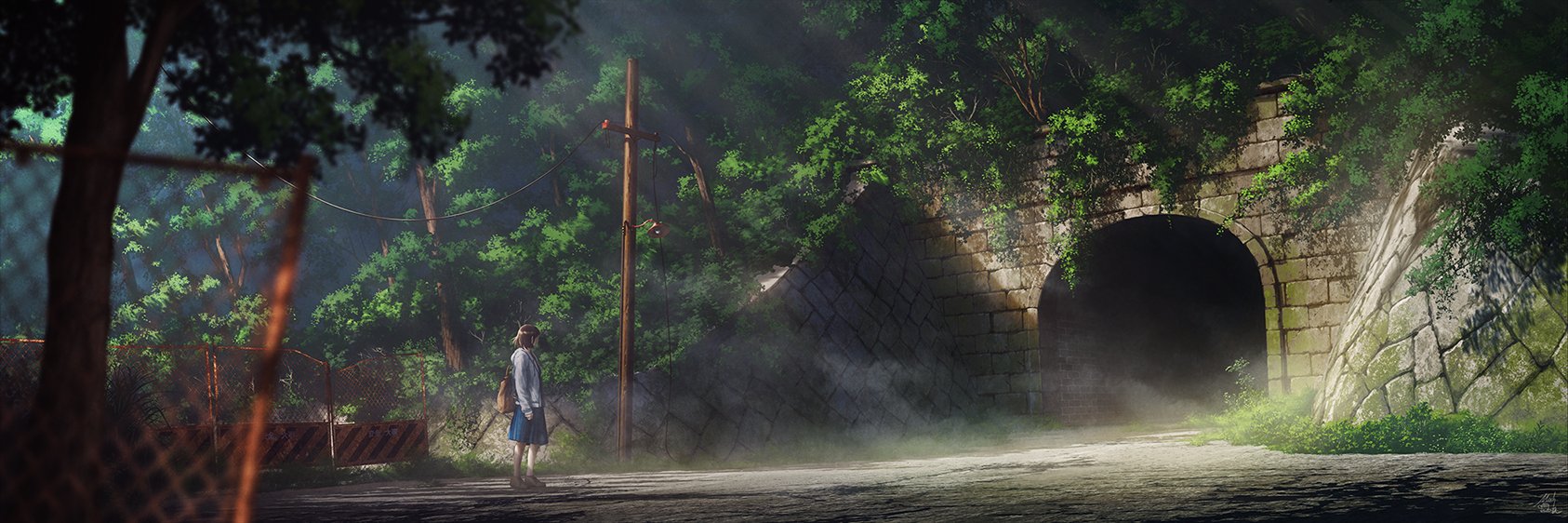on
The Tunnel

The tunnel had always unnerved the village residents. It had taken Kaori months to realise it was there, so careful were her neighbours to avoid mentioning it. Tucked away down an overgrown dirt track and surrounded by forest and creeping vines, it pierced the heart of the mountain. She wasn’t the adventurous type, but when a group of gangly limbed children had exploded from the trailhead in front of her, laughing and wailing in equal measure, her curiosity had been piqued. Between breathless gasps the kids said they had heard voices, whispers from the pitch black opening that defied even the oppressive mid-summer sun.
A politician had originally championed the construction of the tunnel in the late sixties: a transparent attempt to win votes for his election campaign. “A direct route to Osaka” he had claimed, “from your home to the city in under two hours”. The wealth of land in the area made the village’s votes highly coveted, and with two large and storied families controlling the majority, it didn’t take long for questionable deals to be struck.
Boring through rock and dirt with little care for the wilderness around it raised the ire of some of the aging villagers. Several generations of residence gave their voices weight, but complaints about disturbing the mountain lord were met with indifferent silence. At their behest a local priest was summoned to perform purification rituals, the jangle of rings on staffs and throaty chants were always drowned out by the sound of metal on stone. Workers shared furtive stories of getting lost in tunnels that didn’t exist, or of blackening bruises without any origin, all dismissed by the foreman as the ramblings of a provincial workforce.
The politician, duly elected, was weathered by banal scandals. First of mistresses and illegitimate children then by his secretive position on a familiar local construction firm’s board of directors. A dispute over the mineral rights of the mountain first stalled, then postponed and eventually quietly called off the construction of the tunnel. The petty bickering of the land owners saw branch families called home and great swathes of legal documentation - some still long-hand on mouldering scrolls - brought to bear.
Kaori knew none of this when she arrived in the village at the start of her last year of middle school. The workmen had long since moved on, the fresh asphalt now cracked and metal corroded and ensnared in vines. Plucked from an uneventful suburban home by her free-spirited parents, she settled into a life of permanently unlocked doors, the screech of cicadas and the sedentary life of the countryside.
Her entire focus was on the tunnel. She knew now that it went nowhere, less than a couple hundred metres until an abrupt rock face. When asking her classmates had been met with blank looks or evasive answers, she had pored over reports and newspaper clippings from the local library. The question of why she was fascinated with it never crossed her mind. Fervent days since her first encounter, she found herself standing in front of it, the gooseflesh chill of morning still in the air, her backpack loaded up with all the paraphernalia she assumed she needed.
A deep, almost reverent, stillness surrounded the entrance. Nothing moved. Any sunlight stopped a few metres in, electrical cabling had been run but never connected. There were doors in the tunnel that led nowhere, the service corridors had been planned but not excavated. There had been earthquakes and landslides in the intervening years; no one knew, or cared, if the tunnel was still traversable.
Her heart calm and mind clear, Kaori walked purposefully into the tunnel.